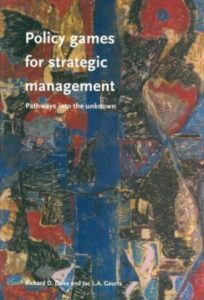Policy Games for Strategic Management
In the life of each organization, situations arise that are completely new to the history of the organization. These situations are complex, surprising, urgent, inspiring, threatening and sometimes enduring. Leadership is forced to bring the organization into uncharted territory. Facing these situations, and often after a period of muddling through in a business-as-usual way, leadership has to recognize that a breakthrough response will only emerge from a previously unexplored (and, for this organization, a revolutionary) strategy process. Think about the bewilderment in a high-tech company when an emerging technology from a competitor threatens the whole existence of their organization.
The California energy crisis in 2002 is another example: by initially oversimplifying the problem and failing to identify and evaluate major alternatives, the state found itself in a crisis of its own making. If there had been proper communication about this complex system among all interested parties (e.g. suppliers, regulatory agencies, distributors, and consumers), it is unlikely that the decisions made would have proven so unsatisfactory. Yet another instance is the dilemma faced by a nationalized railway or postal service – is deregulation an opportunity or a threat? Should they lobby against adoption of a new deregulation law, or pursue it as a great opportunity?
According to William Halal, who assessed the state-of-the-art of strategic planning in his study of 25 major corporations: “Issues can be thought of as stress points resulting from the clash between the organization and its continually changing environment. The magnitude of change is so great now that the social order has become a discontinuity with the past, creating a deep division between most firms and their surroundings that allows the environment to bear against the organization like a drifting continental plate. Issues comprise the societal hot spots that are generated at this stressful interface, forming social volcanoes that often erupt unexpectedly to shower the corporation with operational brush fires” (Halal, 1984, p. 252).
Two examples of such change are cited in the following pages. Suffice it to say that there is a class of macro-problems in uncharted territory which lead to “bet the organization” decisions.
How to Enter an Unknown Land?
Much has been written for leaders of organizations about the need to improve the quality of strategic decision making when one is faced with conditions of turbulence and revolution. Decisions have to be taken faster, they have to be more creative, they must draw on the wisdom of many, and they also need the commitment of several internal and external stakeholders. Academic and popular writers on strategy and policy mention the growing complexity and turbulence of the environment, the growing interconnectedness of organizations, and the growing importance of stakeholder participation and organizational responsibility. Management must become aware of the need to flatten the organizational structure because of increasing knowledge intensity and the escalating professionalism of work.
This is just a short list of the underlying causes for the need to dramatically change the style and process of strategic management. When entering terra incognita, leadership has to ensure that those involved in policy development create consistent, doable, relevant and creative strategies. These must be based on a shared understanding of context and totality, an inspiring image of the future, clear value tradeoffs and well-tested and explored alternatives for action. How is it best to realize all these demands? How can all of this be brought to life in a typical conference room? That is the question the book Policy games for strategic management – Pathways into the unknown addresses. We want to show how a discipline called gaming/simulation can help organizations to realize these objectives.
There are reasons enough to become somewhat cynical when one reads the above summary. Many limiting factors in the capabilities of even the wisest individuals and the best-run organizations make it very difficult to even begin to live up to the standards of decision making now required. There are always time and resource constraints, and there is the basic human tendency to simplify complexity. Because of differing (and often conflicting) perspectives pertinent to the many disciplines and functions present in every large social structure, organizations frequently face severe communication problems. Within and between organizations, many opportunities for cooperation are never explored because of real or perceived differences in values and interests. There is often a lack of talent, imagination and/or patience to examine a strategic issue thoroughly instead of adopting the most obvious alternatives, which are easiest to implement given the existing balance of power.
Policy Exercises: Preparing for the Unknown
In the book, we analyze the structure of strategic problems in uncharted territory and explore what it takes to handle these problems. We show in detail how certain organizations have successfully dealt with them, using the policy exercise methodology based on the discipline of gaming/simulation. Experienced and responsible clients and observers of this methodology have evaluated this approach as very effective and practical. To stay in line with common practice, and also for stylistic reasons, we use the terms “policy exercise” and “policy game” synonymously.
The policy games presented in the book were created as “safe environments” where people who have a key role in confronting major problems can bring their knowledge and skills to the forefront of the strategic debate. They provide the opportunity for “as real as possible” experiential learning to mobilize core competencies and test the skills that may be needed in the future. They help to develop confidence and ownership and reduce the fear of the unknown.
Games have an important role in making sure that strategies are doable in the eyes of the doers. The basic assumption and thus the message of this book is that gaming/simulation is a powerful strategic tool for organizations which are required to enter uncharted territory. A gap exists between the gaming discipline and the literature on strategic management. In professional and academic journals on policy, strategy, and organizational change, one finds little about successful gaming applications. This is unfortunate, because a properly devised gaming/simulation rapidly enhances the sophistication of the participants. The technique is particularly well suited for circumstances where the objectives are to provide an integrative experience, illustrate management techniques in an experiential manner, develop esprit de corps among a group, convey an overview or systems “gestalt” (the big picture), and provide an environment for experimenting with improving group process. Gaming/simulations offer a fruitful potential for melding many skills.



